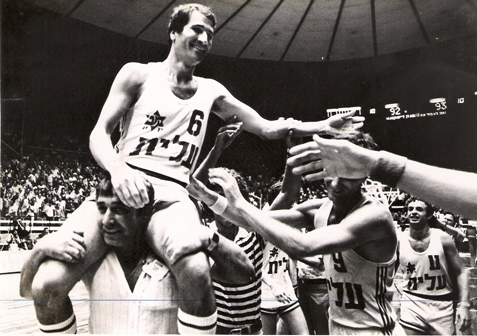One of the more rousing documentaries to screen at the recent DOC NYC Festival was this celebration of the 1977 Maccabi Tel Aviv basketball team, whose victory at the European Cup tournament was also a great win for Israel. On the court, the club had to overcome traditional basketball powers such as Italy, Spain, and especially the Soviet Union. Meanwhile, Israel was still a struggling start-up nation that had already endured its share of war and was also dealing with a sluggish economy.
Clearly, a boost was needed, and it came in the form of a sport that up until then lacked much of a following. The proverbial game-changer was the signing of Tal Brody, who in 1965 was drafted out of the University of Illinois by the NBA’s Baltimore Bullets. Of Jewish heritage, Brody spent the subsequent summer playing for the U.S. team in an Israeli tournament and came to view playing for Maccabi as obeying a higher calling. Due to these types of sentiments, as well as a smooth floor game, he soon became a fan favorite and began elevating the profile of Israeli basketball.
But while Brody was a terrific player, he also made Israel a viable option for other Jews making the leap directly from the college ranks or for professionals whose NBA careers had waned. Of those who would join Maccabi in the years leading up to its first championship, forwards Lou Silver and Jim Boatwright were recruited from Harvard and Utah State, respectively. Of the pros, there was center Aulcie Perry, who signed on prior to the 1977 season after being discarded by the New York Knicks; as an African American from New Jersey, he proved an unlikely hero for Israel.
Other key figures included Israeli-born guard Miki Berkovich, the team’s next star-in-waiting behind Brody. After introducing this band of dreamers, castoffs, and underdogs, the film follows the familiar rhythm of other sports movies, documentary or otherwise. There is the requisite “season on the brink” moment, which comes after the Italian team Varese crushes Maccabi. Tempers between players flare-up and an actual fight breaks out during a practice. However, instead of imploding, Maccabi turns things around in time to make their magical tournament run.
After defeating the heavily favored Real Madrid and Czechoslovakia during the first two rounds, the club’s next date is with the notorious Soviet team, CSKA Moscow. The film frames the matchup as more than just a game. Given the three million Jews living under oppressive conditions in Communist Russia at the time, and the Soviets’ support of Israel’s enemies during the Yom Kippur War, it’s viewed as the epic showdown between good and evil. To a lesser degree, the game represents a rematch of the 1972 Olympic gold medal finale between the United States and the Soviet Union, which the latter won under much controversy—along with there being several Americans on Maccabi’s squad, seven of CSKA’s players were on that Soviet team.
Due to the amount of geopolitical intrigue leading up to the game, the championship round afterward comes across as somewhat anticlimactic. But what keeps the film afloat is the sight of Tel Aviv ground to a halt by basketball fever: the streets are deserted, due to everyone being indoors and transfixed by their TVs. At one point, a very unexpected political event is ready to be announced, but no camera crew can be found to film it, since they are all out shooting footage of the postgame revelers.
There is a clip of Tal Brody’s famous declaration that Israel was “on the map” after winning the championship, which has been interpreted as announcing its arrival as both a basketball power and a nation. While such moments are inspiring, there is also behind-the-scenes footage that humanize the athletes: Berkovich’s nervousness ahead of playing the Russians; the unexpected family emergency that takes a key player away at the most inopportune time possible. On the Map is a film about basketball, a nation’s coming of age, and how the two intertwined, but it’s also about the men who brought home glory despite great odds.
By never losing sight of its protagonists, the film pays sufficient homage to what, four decades later, still stands as an impressive achievement.

















Leave A Comment